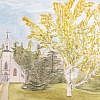Nicolas Denys: explorer/entrepreneur
Posted Jun 9, 2015
With the adventurous spirit of an explorer and the observant mind of a writer, Nicolas Denys knew a thing or two about never giving up.
Born in France in 1598, he received little formal education and described himself as belonging to “a family of engineers.” He had a knack for navigation, fishing, and lumbering, and spent much of his first three decades working as a merchant.
Everything changed for Nicolas at the age of 34, when he got the opportunity to sail to the New World in the hope of strengthening its French presence.
A ship with more than 300 men arrived in “Acadia” — a colony of New France that included the Maritimes as well as parts of Quebec and Maine — and they founded a colony at the LaHave River. They worked to reclaim the tidal marshlands using a system of dikes and drainage sluices, and traded peacefully with their Mi’kmaq neighbours.
Nicolas returned to France briefly after the colony broke up in 1635, but he was eager to return to his adopted home with his wife shortly after they were married. For 15,000 livres (about £1,125), he purchased the rights to the coast and islands of the Gulf of St. Lawrence from Cap Canso to Cap des Rosiers on the Gaspé — which included Isle Royale (known today as Cape Breton Island), Île Saint-Jean (known today as Prince Edward Island), and the Îles de la Madeleine.
But things had changed significantly since Nicolas had left Acadia. There were violent battles over resources, markets, and the colony itself. He attempted to escape the hostility by building a fortified fishing and trading post on the south shore of Miscou Harbour in 1645. He became the Governor of Canso and Isle Royale, and founded settlements at St. Pierre (St. Peter’s, NS), Ste. Anne (Englishtown, NS), and Nepisiquit (Bathurst, NB).
Unfortunately, Nicolas’s life was never long without change and drama, but he never stopped working to restore justice. When his properties were seized by force in 1654, he took the issue to the attention of King Louis XIV – who commanded, by royal decree, for Nicolas’s property to be restored to him.
Not one to focus on setbacks, Nicolas founded the first commercial brewery in Atlantic Canada in what would become the Town of Guysborough in 1659.
Nicolas suffered another setback in 1669, when his home and business were destroyed in a fire – leaving he and his family on the brink of financial ruin. At the age of 70, he was in debt 100,000 livres (about £7,500) and forced to move everyone to the home he’d built in Nepisiquit.
He turned his attention to writing, and spent nearly two decades writing about his experiences at Acadia until his death in 1688. His two-volume study, Description géographique et historique des costes de l’Amérique septentrionale: avec l’histoire naturelle du païs, is considered to be one of the most valuable accounts of Acadia produced in the 17th century.
He wrote vivid descriptions of the coastal area, and told of his experiences in the region. The second volume focused on the area’s natural resources – fish, in particular – and tales of living among his Mi’kmaq neighbours for 40 years.
While the book reflects Nicholas’s lack of formal education, its value – and entertainment value – is undeniable. He wrote honestly and cheerfully about the country and its people, and provided historians with accurate records of a time plagued by violence and chaos. Without his written chronicles of those exciting years, we would not have a clear picture of what happened during the formation of the New World.
Although Nicolas’s settlements did not become permanent, writing about the country encouraged others to come discover the area on their own. Optimistic until the end, he wrote in his study: “I believe that I have not altogether lost my time, even though it has been thwarted by a thousand misfortunes.”
Nicolas Denys knew that it’s never too late to take a chance, to chase a dream, to embrace the unknown …




